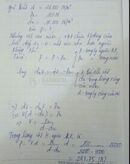
Hãy nhập câu hỏi của bạn vào đây, nếu là tài khoản VIP, bạn sẽ được ưu tiên trả lời.



a) ĐK : \(x\ne1\); \(x\ne-1\)
b) Ta có biểu thức:
\(B=\left(\frac{x+1}{2x-2}+\frac{3}{x^2-1}-\frac{x+3}{2x+2}\right).\left(\frac{4x^2-4}{5}\right)\)
\(=\left(\frac{x+1}{2.\left(x-1\right)}+\frac{3}{\left(x+1\right)\left(x-1\right)}-\frac{x+3}{2.\left(x+1\right)}\right).\left(\frac{4.\left(x^2-1\right)}{5}\right)\)
\(=\frac{\left(x+1\right)^2+3.2-\left(x+3\right)\left(x-1\right)}{2.\left(x-1\right)\left(x+1\right)}.\frac{4.\left(x+1\right)\left(x-1\right)}{5}\)
\(=\frac{x^2+2x+2+6-x^2-2x+3}{2.\left(x-1\right)\left(x+1\right)}.\frac{4.\left(x+1\right)\left(x-1\right)}{5}=\frac{40.\left(x+1\right)\left(x-1\right)}{10.\left(x+1\right)\left(x-1\right)}=4\)
Vậy giá trị của biểu thức B không phụ thuộc vào biến x khi \(x\ne1;x\ne-1\)

a) ĐKXĐ: \(x\notin\left\{1;-1\right\}\)
b) Ta có: \(B=\left(\dfrac{x-2}{2x-2}+\dfrac{3}{2x-2}-\dfrac{x+3}{2x+2}\right):\left(1-\dfrac{x-3}{x+1}\right)\)
\(=\left(\dfrac{x-1}{2x-2}-\dfrac{x+3}{2x+2}\right):\left(\dfrac{x+1-x-3}{x+1}\right)\)
\(=\left(\dfrac{\left(x-1\right)\left(x+1\right)}{2\left(x-1\right)\left(x+1\right)}-\dfrac{\left(x+3\right)\left(x-1\right)}{2\left(x-1\right)\left(x+1\right)}\right):\dfrac{-2}{x+1}\)
\(=\dfrac{x^2-1-x^2-2x+3}{2\left(x-1\right)\left(x+1\right)}\cdot\dfrac{x+1}{-2}\)
\(=\dfrac{-2x+2}{2\left(x-1\right)}\cdot\dfrac{-1}{2}\)
\(=\dfrac{-2\left(x-1\right)}{2\left(x-1\right)}\cdot\dfrac{-1}{2}\)
\(=\dfrac{1}{2}\)
Vậy: Khi x=2005 thì \(B=\dfrac{1}{2}\)

\(A=x^2-6x+10\)
\(\Leftrightarrow A=x^2-2\cdot x\cdot3+3^2-9+10\)
\(\Leftrightarrow A=\left(x-3\right)^2+1\ge1\) \(\forall x\in z\)
\(\Leftrightarrow A_{min}=1khix=3\)
\(B=3x^2-12x+1\)
\(\Leftrightarrow B=\left(\sqrt{3}x\right)^2-2\cdot\sqrt{3}x\cdot2\sqrt{3}+\left(2\sqrt{3}\right)^2-12+1\)
\(\Leftrightarrow B=\left(\sqrt{3}x-2\sqrt{3}\right)^2-11\ge-11\) \(\forall x\in z\)
\(\Leftrightarrow B_{min}=-11khix=2\)

\(B=\left(2x-1\right)^2+\left(x+2\right)^2\)
\(=4x^2-4x+1+x^2+4x+4\)
\(=5x^2+5\)
Ta thấy \(5x^2\ge0\forall x\)
\(\Rightarrow5x^2+5\ge5\)
\(\Rightarrow B\ge5\)
Dấu "=" xảy ra khi \(x=0\)
...
\(B=4x^2-4x+1+x^2+4x+4\)
\(=5x^2+5\ge5\)
Dấu "=" xảy ra <=> x^2 = 0 <=> x = 0
GTNN của B là 5 khi x = 0

Áp dụng Bunyakovsky, ta có :
\(\left(1+1\right)\left(x^2+y^2\right)\ge\left(x.1+y.1\right)^2=1\)
=> \(\left(x^2+y^2\right)\ge\frac{1}{2}\)
=> \(Min_C=\frac{1}{2}\Leftrightarrow x=y=\frac{1}{2}\)
Mấy cái kia tương tự

a: x là đơn thức một biến
b: A(x)=-x^2+2/3x-1
Đặt A(x)=0
=>-x^2+2/3x-1=0
=>x^2-2/3x+1=0
=>x^2-2/3x+1/9+8/9=0
=>(x-1/3)^2+8/9=0(vô lý)
c: B(-3)=(-3)^2+4*(-3)-5
=9-5-12
=4-12=-8



B=(x+1)(x+4)(x+2)(x+3)\(=\left(x^2+5x+4\right)\left(x^2+5x+6\right)\)
đặt x^2+5x+5 =t (t>=0)
=> B=\(\left(t+1\right)\left(t-1\right)=t^2-1\) ta có: \(t^2\ge0\Rightarrow t^2-1\ge-1\Rightarrow MinB=-1\Leftrightarrow t=0\Leftrightarrow x^2+5x+5=0\Leftrightarrow\left(x^2+5x+\frac{25}{4}\right)=\frac{5}{4}\Leftrightarrow\left(x+\frac{5}{2}\right)^2=\frac{5}{4}\Rightarrow x=-\frac{5}{2}+-\frac{\sqrt{5}}{2}\)
B=(x+1)(x+2)(x+3)(x+4)T=(x+1)(x+2)(x+3)(x+4)
=(x+1)(x+4)(x+2)(x+3)=(x+1)(x+4)(x+2)(x+3)
=(x2+5x+4)(x2+5x+6)=(x2+5x+4)(x2+5x+6)
Đặt :x^2+5x+4=ax2+5x+4=a ⇒T=(a−1)(a+1)⇒T=(a−1)(a+1)
=a^2−1=(x2+5x+5)2−1≥−1=a2−1=(x2+5x+5)2−1≥−1
Vậy MinT=−1MinT=−1 khi
x2+5x+5=0⇒(x2+5x+254)−54=0x2+5x+5=0⇒(x2+5x+254)−54=0⇔(x+52)2=54⇔(x+52)2=54
\(\Rightarrow\orbr{\begin{cases}x+\frac{5}{2}=\sqrt{\frac{5}{4}}\\x+\frac{5}{2}=-\sqrt{\frac{5}{4}}\end{cases}}\Rightarrow\orbr{\begin{cases}x=\sqrt{\frac{5}{4}-\frac{5}{2}}\\x=-\sqrt{\frac{5}{4}-\frac{5}{2}}\end{cases}}\)